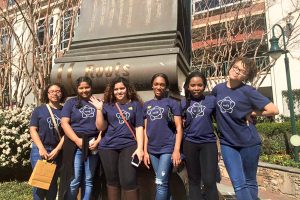Roosevelt Group Gets to the “C.O.R.E.” of Issues
Roosevelt High School’s C.O.R.E. for Advancement (Community of Racial Equity) isn’t your garden variety extracurricular club.
C.O.R.E. is a student-led group whose purpose is to unite strong leaders in support of students of color pursuing college-level courses. And word is getting around.
On March 8th C.O.R.E students and their faculty advisers presented at the national conference A Dream Deferred: The Future of African American Education in Charlotte, North Carolina.
“We had a large audience of teachers, administrators, and counselors from around the nation and received overwhelmingly positive feedback,” said Petra Lange. Lange is a former DMPS teacher who helped establish C.O.R.E last year at Roosevelt before taking a new position at Drake University. As the Special Programs Coordinator in the Drake School of Education she remains in the thick of things at DMPS, like the customized master’s degree (an M.S.E. in Culturally Responsive Leadership and Instruction) that is part of the district’s innovative Alternative Teacher Contract. And she took the post only with the clear understanding that she could remain connected to Roosevelt’s C.O.R.E.
Lange and Roosevelt Spanish teacher Kalifornia Gray were joined by students Nosa Ali and Samantha Alexander as presenters at the conference.

Roosevelt students Nosa Ali, Samantha Alexander, Cheyenne Johnson, Simone Kapayou, Merna (Dina) Mohamed and Jazzy Jones attended and presented at a national C.O.R.E. conference in Charlotte, NC.
According to Lange, the C.O.R.E presentation at the conference was the only one of the accepted applications that included students. Together the foursome chronicled C.O.R.E.’s origins, mission and activities and outlined the cultural context which gave rise to the organization (e.g., 22% of Roosevelt students are African American but they took only 9% of the school’s AP exams). Besides Nosa and Samantha other Roosevelt students who attended were Cheyenne Johnson, Simone Kapayou, Merna (Dina) Mohamed and Jazzy Jones. Approximately 20 students are regular participants in C.O.R.E.
“The presentation went brilliantly,” said Lange. “Students helped create it and answered questions throughout. Our audience was clearly impressed and curious to learn more about what we’re doing.”
“We came up with our own hashtag and lots of people from other cities and schools were tweeting at us, too,” said Nosa.
Besides being instrumental in increasing the enrollments of African-American students in AP courses at Roosevelt, C.O.R.E. maintains a regular monthly outreach effort to Roosevelt’s feeder middle schools. Incoming freshmen are invited to C.O.R.E. before they ever start classes at Roosevelt. C.O.R.E members support one another academically through collaborative study sessions and peer tutoring. The group is dedicated to building a wide, sturdy bridge across the achievement gap.
Gray is in her second year at Roosevelt. She grew up in tiny, rural, Lawton, Iowa. Not much diversity there, so when Lange enlisted her as a faculty sponsor for C.O.R.E. she jumped in with both feet.
“I was anxious to better understand and connect with my students here,” she said at one of the group’s weekly meetings recently. “And this has been a rewarding way to do that. I also consider this professional development for me.”
Now that some of the C.O.R.E students have experience as conference presenters, why stop? Lange is planning a summer symposium at Drake to be sponsored by Nationwide Insurance aimed at increasing minority enrollments in challenging academic tracks and overcoming stereotypes. Nosa, Samantha and others plan to collaborate with Drake grad students as presenters there. Considering that a symposium is “a formal meeting at which experts (emphasis added) discuss a particular topic,” it’s fair to say that C.O.R.E. is more than just another extracurricular club now. No disrespect to Roosevelt’s longstanding Sharks Club (synchronized swimming), a prime and proud example of the school’s rich history, but C.O.R.E. is all about shaping the future.
Next steps include soliciting help from the Drake Legal Clinic and the Community Foundation of Greater Des Moines in formally establishing a nonprofit mechanism to facilitate fundraising and expansion. C.O.R.E is anxious to go deeper into a mission that many seem eager to join.
The central administration of the district is comprised of career educators committed to the declared goal of making DMPS the national model for urban education. With the help of expert student forces like C.O.R.E., progress is happening and the word is spreading.





